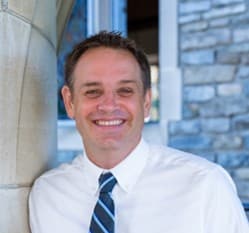
The theological consultation was convened to develop and implement strategies to equip and strengthen the grassroots churches of Africa. The main objective of the consultation was to respond to research that 85-90% of pastors and church leaders in Africa have little to no biblical and theological training; required to effectively disciple their congregations.This consultation challenged the participants to scale up biblical and theological training of another 20% of pastors and church leaders in Africa over the next five years.

Matthew Elliott presenting an ASB Bible to Mrs. Elizabeth Villengue from Angola
Resources were also provided with every participant receiving a complimentary copy of the Africa Bible Commentary and the Africa Study Bible from Langham Literature (ABC) and Oasis International Ltd (ASB) respectively. Matthew Elliott, from Oasis International and Dr. Liz Mburu, Langham Literature Regional Coordinator Africa, were also key presenters at the consultation addressing the need for discipleship training tools and resources. Other conference partners like Tearfund (Dr. Sas Conradrie), South Africa Theological Seminary (SATS) (Dr. Kevin Smith), Overseas Council (Dr. John Jusu), Africa Leadership Study (Dr. David Ngaruiya), Global Scholars (Dr. Danny McCain) and Re-Forma (Reuben Van Rensburg).
Dr. Goodwill Shana, AEA President and Chair of the World Evangelical Alliance International Council, outlined in his opening address why AEA felt the need to plan the Theological conference and explained the need for Africa to be transformed through the power of God’s word. Professor Victor Cole was the keynote speaker during the conference and presented Strategies in Formal, Non-Formal and Informal Modes of Training and highlighted means to effectively scale up training to meet the challenge. Other conference speakers were Dr. Christine Mutua, Dr. Mark Dye, and Dr. David Ngaruiya with Dr. John Jusu, Rev. Dr. Aiah Foday Khabenje, Dr. James Nkansah and Dr. Ted Barnett facilitating the meetings.
Structure of the Consultation

Plenary presentations and group discussions were a main feature of the meetings. There was also an opportunity for participants to learn about various training curricula using formal, non-formal and informal approaches. Organizations who are successfully using a training curriculum were invited to share their curriculum in day 3 of the consultation so as to expose participants to the different curricula over a two hour-time slot.
Feedback from Theological Consultation
We received overwhelming positive response throughout the week as well as tabulated feedback from the 140 completed evaluation forms turned in by the end of the consultation. Some reflections below from respondents provide some insight in to what the AEA considers a successful conference and through God’s favour- the impetus needed to scale up training to the 20%.
When asked if it was worth coming to the Consultation
“Yes, a thousand times! This has been the most eye opening conference I have ever attended.”
“I have been refreshed greatly and it has been a time well spent. Even outside the sessions I had wonderful fellowship with Church leaders from across Africa.”
Regarding the Speakers/Presenters
“All of them were seasoned for the times we are in.”
“All speakers had content and delivery most effective.”
“I would like to hear the main speakers again. Dr. Cole was mind challenging. Mark Dye‘s presentation was eye opening to what can be done and how. Dr Christine Mutua’s presentation was excellent.”
Regarding deeper insights and ideas that will make a difference:
“There is a glaring need for equipping the most influential leaders in Africa, which are the 85 to 90% untrained or undertrained Pastors, church leaders… The academy needs to intentionally partner with the grassroots church to design programs that will integrate formal, non-formal and informal modes of training.”
“Be innovative in our Seminary curricula to train people as ministers and facilitators of the training at a grassroots level.”
“Re-strategizing learning and training processes to accommodate a wider demographic and representative groups of the church.”
“The 20% trained pastors and church leaders need to reproduce themselves on a personal level by mentoring and equipping identified potential leaders. I see myself as part of this process in the next five years planning to take at least two people through this process.
The organizers, speakers, facilitators and participants united in great thanksgiving to God for what He accomplished through the consultation in focusing the church across Africa on brining effective training to the 85-90 of Africa’s church leaders who lack effective biblical and theological training. Please keep the goal of 20% increase in trained leaders in five years in your daily prayers.





Stay Connected